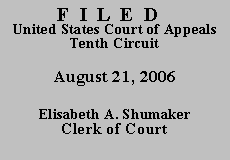

| ANTHONY EARL KENNEDY, |
|
| v. | |
| ERASMO BRAVO, Warden, Lea County Correctional Facility; ATTORNEY GENERAL FOR THE STATE OF NEW MEXICO, |
At trial the state presented testimony from Detective Jerry Belotti of the Albuquerque Police Department that he had purchased a rock of crack cocaine from Mr. Kennedy for $20 as part of a "buy/bust" operation on March 18, 2002. A small rock of cocaine--purportedly the drugs sold by Mr. Kennedy to Detective Belotti--was admitted into evidence over Mr. Kennedy's objection that a discrepancy in the date in a notation on the evidence tag indicated a break in the chain of custody.
Mr. Kennedy alleges a due-process violation because the evidence at trial was insufficient to support his conviction. He argues that the alleged discrepancy in the date on the evidence tag indicates that there was no physical evidence in his case and that the prosecution deliberately used false evidence and false testimony to convict him. He also claims that his trial counsel was constitutionally ineffective in failing to investigate and challenge this key evidence and for insisting on pursuing an entrapment defense over Mr. Kennedy's objections. The district court adopted the magistrate judge's conclusions that the evidence was more than sufficient to sustain Mr. Kennedy's conviction and that his trial counsel's cross-examination of the forensic chemist and objection to the proffered physical evidence indicated an adequate investigation of the potential evidentiary challenges.
A COA will issue "only if the applicant has made a substantial showing of the denial of a constitutional right." 28 U.S.C. 2253(c)(2). This standard requires "a demonstration that . . . includes showing that reasonable jurists could debate whether (or, for that matter, agree that) the petition should have been resolved in a different manner or that the issues presented were adequate to deserve encouragement to proceed further." Slack v. McDaniel, 529 U.S. 473, 484 (2000) (internal quotation marks omitted). In other words, the applicant must show that the district court's resolution of the constitutional claim was either "debatable or wrong." Id.
The Antiterrorism and Effective Death Penalty Act of 1996 (AEDPA), provides that when a claim has been adjudicated on the merits in state court, a federal court will grant habeas relief only when the applicant establishes that the state court decision was "contrary to, or involved an unreasonable application of, clearly established Federal law, as determined by the Supreme Court of the United States," or "was based on an unreasonable determination of the facts in light of the evidence presented in the State court proceeding." 28 U.S.C. § 2254(d)(1), (2).
Under the "contrary to" clause, we grant relief only if the state court arrives at a conclusion opposite to that reached by the Supreme Court on a question of law or if the state court decides a case differently than the [Supreme] Court has on a set of materially indistinguishable facts. Under the "unreasonable application" clause, relief is provided only if the state court identifies the correct governing legal principle from the Supreme Court's decisions but unreasonably applies that principle to the facts of the prisoner's case. Thus we may not issue a habeas writ simply because we conclude in our independent judgment that the relevant state-court decision applied clearly established federal law erroneously or incorrectly. Rather, that application must also be unreasonable.
Gipson v. Jordan, 376 F.3d 1193, 1196 (10th Cir. 2004) (internal quotations, citations and brackets omitted). "AEDPA's deferential treatment of state court decisions must be incorporated into our consideration of a habeas petitioner's request for COA." Dockins v. Hines, 374 F.3d 935, 938 (10th Cir. 2004).
The district court's resolution of Mr. Kennedy's constitutional claims was neither wrong nor debatable. The state presented evidence--particularly the testimony of Detective Belotti--sufficient for the jury to find Mr. Kennedy guilty of cocaine trafficking. See Jackson v. Virginia, 443 U.S. 307, 319 (1979) (in reviewing a habeas attack on the sufficiency of evidence to support a conviction, "the relevant question is whether, after viewing the evidence in the light most favorable to the prosecution, any rational trier of fact could have found the essential elements of the crime beyond a reasonable doubt"). The state court's rejection of Mr. Kennedy's sufficiency-of-the-evidence argument was undebatably not an unreasonable application of federal law.
As for Mr. Kennedy's ineffectiveness claim, the magistrate judge's Findings and Recommendation cogently explains that Mr. Kennedy has failed to point to any deficiency of his attorney in investigating the case or challenging its physical evidence. And in light of the evidence of guilt, counsel's decision to pursue an entrapment defense was clearly within the realm of acceptable strategy.
We DENY Mr. Kennedy's request for a COA and DISMISS the appeal.
ENTERED FOR THE COURT
Harris L Hartz
Circuit Judge
*.After examining the briefs and appellate record, this panel has determined unanimously that oral argument would not materially assist the determination of this appeal. See Fed. R. App. P. 34(a)(2); 10th Cir. R. 34.1(G). The case is therefore ordered submitted without oral argument. This order and judgment is not binding precedent, except under the doctrines of law of the case, res judicata, and collateral estoppel. The court generally disfavors the citation of orders and judgments; nevertheless, an order and judgment may be cited under the terms and conditions of 10th Cir. R. 36.3.